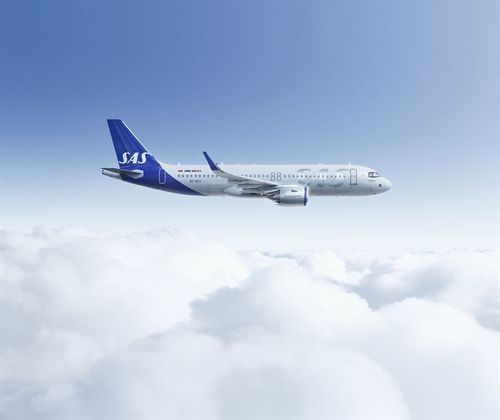SAS: SAF reduces emissions, improves air quality

SOURCE: SAS
November 28, 2023
BY SAS
Biobased aviation fuel reduces the number of ultrafine particles that are emitted from the aircraft engines, thereby improving air quality. This is one of the conclusions drawn from a large-scale international study using a SAS aircraft at Copenhagen Airport.
Researchers measured an aircraft with 34 percent biobased fuel (known as sustainable aviation fuel, SAF), in the tank while it was taxiing between the runway and the gate at the airport. Ground measurements show a reduction in the emission of ultrafine particles by about 30 percent.
Advertisement
The measurements were conducted by researchers from DLR, The German Aerospace Center. During the experiment, they set up a mobile laboratory with advanced measuring equipment at a gate in Copenhagen Airport. From there, they measured air quality when a SAS aircraft with 34 percent SAF blended in its fuel tank arrived in Copenhagen from Stockholm. Measurements were done three to four times daily and conducted while the aircraft was on ground and taxiing between runway and gate.
Results from the measurements provide the most detailed picture to date of the effect of using SAF on local air quality at the airport.
“SAS is very proud to participate in this project as it is a great example of how our collective efforts can enable further discoveries of sustainable solutions for the aviation industry. The findings of this unique experiment at Copenhagen Airport showcase that using SAF not only reduces CO2 emissions but also reduces the impact of contrails, and enhances local air quality,” says Ann-Sofie Hörlin, head of sustainability at SAS.
Advertisement
"This is really good news. It's an important discovery that sustainable aviation fuel has an impact on air quality. We already know that it helps reduce CO2 emissions, so this is another significant benefit of shifting aviation to sustainable fuels," said Christian Poulsen, chief operating officer at Copenhagen Airport.
It is a unique experiment, taking place over a period of four weeks during winter. It's the first time that such extensive measurements have been conducted in an authentic airport environment, making it a highly complex experiment.
Related Stories
U.S. fuel ethanol capacity fell slightly in April, while biodiesel and renewable diesel capacity held steady, according to data released by the U.S. EIA on June 30. Feedstock consumption was down when compared to the previous month.
XCF Global Inc. on July 8 provided a production update on its flagship New Rise Reno facility, underscoring that the plant has successfully produced SAF, renewable diesel, and renewable naphtha during its initial ramp-up.
The USDA’s Risk Management Agency is implementing multiple changes to the Camelina pilot insurance program for the 2026 and succeeding crop years. The changes will expand coverage options and provide greater flexibility for producers.
EcoCeres Inc. has signed a multi-year agreement to supply British Airways with sustainable aviation fuel (SAF). The fuel will be produced from 100% waste-based biomass feedstock, such as used cooking oil (UCO).
President Trump on July 4 signed the “One Big Beautiful Bill Act.” The legislation extends and updates the 45Z credit and revives a tax credit benefiting small biodiesel producers but repeals several other bioenergy-related tax incentives.
Upcoming Events










